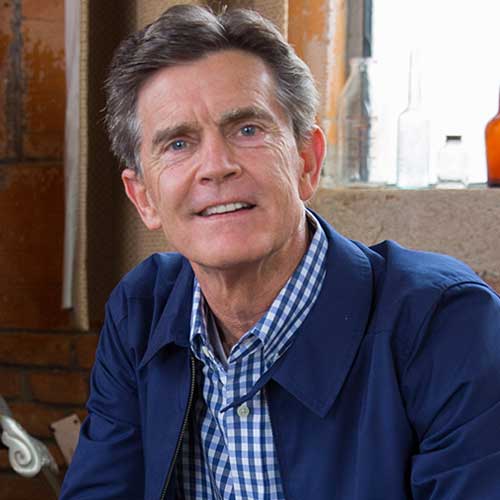Session 6: How to Grow as a Leader
Getting Started as a Small Group Leader
Leadership isn’t a sprint; it’s a marathon. In this last session, Matt shows you how to thrive through the different seasons of leadership.
Status: In Progress
Session ToolsIn the last session, we’re going to talk about how to grow as a leader. For this whole time, it’s been my prayer that you’ve been challenged and encouraged by this course.
In this last session, we’re going to look at three habits that will keep you moving forward as a leader. Let’s take a look at 1 Peter 5:2-3; “Be shepherds of God’s flock that is under your care, watching over them, not because you must, but because you are willing, as God wants you to be; not pursuing dishonest gain, but eager to serve. Not lording over those entrusted to you, but being examples to the flock.”
The first habit here is to remember that relationships take time. Relationships are built on trust. We talked about that in the last session, but the truth is, is that trust builds slowly. When it comes to deepening relationships, there are no shortcuts. Waiting for trust to build isn’t easy. Sometimes it feels like everything is going great in your group, and then sometimes it feels like there are some setbacks. Sometimes the normal rhythms of life can get in the way, there could be crisis, there are conflicts that can lead people building up walls. Truth is, is that the shepherd has to play the long game, there is no instant success. A shepherd cares for the flock through all the seasons knowing that it takes a lot of time to reach maturity.
Think about the people in your life whom you trust the most. That trust took a long time to build. The same is true for your group. But here is my point in all this. If you are feeling discouraged that your group isn’t growing fast enough, take a deep breath. Let yourself off the hook, and remember that relationships take time.
The next habit is this: evaluate your heart and your leadership. You see, self-evaluation is essential. If we want to change and get better, we need to know what’s working and what isn’t. In this passage that we just read, Peter calls us to be eager to serve, and you see eager is an internal attitude, and serving is an external action. In fact, we’re called to serve others with a humble heart. But how can we be sure that we’re living up to this calling? Here is some ideas for successful evaluation.
The first is this, is, have a clear picture of success. If you’ve already taken the time to clarify the expectations for your group, excellent, start with those. If not, take some time to identify the kind of leader that you want to be.
Next idea is that you do it often. You should take a little bit of time every week. Once a quarter or so, take an extended time to really consider and to reflect. Think about the questions you asked during your group time, and think about how the people responded, and then most importantly, ask why. Were things good? Why? Were things not so good? Why? And then, here is probably the most important question: God, what are you trying to teach me in this?
The next idea is, you would ask for feedback. You could do this with your whole group, and then you can also do this and go one-on-one.
Next idea is that you would celebrate the wins, and this is really an important one. Don’t focus on just the negative stuff, you need to see the whole picture, not just the problems. You need to know what’s going good so that you can work on that and build from there. Finally, move on with specific changes. Nothing becomes dynamic until it becomes specific. You can’t dwell on the past, just like you can’t drive a car in the freeway by only looking in the rear-view mirror.
Let’s talk about the final habit. Number three is this: share responsibility. Now, I hope I’m not the first one to tell you this, but you can’t do everything yourself. You need to learn how to share responsibility if you want to keep serving. This principle is based on Paul’s example. He had Timothy and he had Titus, he had many other partners in ministry. Sharing responsibility has at least three benefits.
First, it lightens your load, and this will help keep you from burning out. Second, it gives others a chance to shine and to really develop. Third, it infuses a new way of doing things. You see, anything you were doing can be shared with others; whether it’s bringing food or hosting the bible study, facilitating the discussion time or the prayer time, or even if it comes to planning a fun event or a service project. Maybe you have a special night of prayer. These are all things that you could pass off to other people.
So, in this session, we looked at the three habits to develop. One, remember that relationships take time. Two, evaluate your heart and your leadership. Three, share responsibility.
As we close our time together, I want to say, way to go for serving your group. Great job for finishing this course. I know we covered a ton of stuff for you to think about, don’t try to apply it all at once. Schedule some time to look over your notes, seek God and ask him to show you what’s next.
I want to end our time together by looking at something the Apostle Paul wrote in 1 Thessalonians, and honestly, this is one of my favorite scriptures. “Because we loved you so much, we were delighted to share with you not only the gospel of God, but our lives as well.”
As a small group leader, this is exactly what you are doing. You are sharing the gospel and your life with the people you love. Here is my encouragement; keep doing that, don’t give up. God is with you and he will keep doing great things through your ministry.





Talk About It
Share with others enrolled in this Online Course